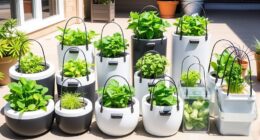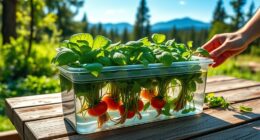When comparing non-GMO and heirloom seeds, you’ll find that non-GMO seeds are not genetically altered, offering high purity and natural integrity, while heirlooms are open-pollinated varieties passed through generations, preserving traditional traits. Heirlooms allow seed saving and tend to be more authentic to their heritage, whereas non-GMO seeds focus on avoiding genetic modification. Want to discover how these differences influence your garden and flavor choices? Keep exploring to see what truly lies in your seed pod.
Key Takeaways
- Non-GMO seeds are not genetically modified, maintaining natural genetic makeup, while heirlooms are open-pollinated varieties passed down through generations.
- Heirloom seeds typically have high seed purity, ensuring true-to-type plants, whereas non-GMO seeds may include hybrids with lower purity.
- Non-GMO seeds focus on natural integrity without DNA alteration; heirlooms preserve traditional traits and flavor through genetic stability.
- Hybrid seeds, often used commercially, may not breed true and can reduce seed purity, unlike heirlooms which support seed saving and genetic diversity.
- Choosing non-GMO and heirloom seeds aligns with natural, sustainable gardening practices, preserving biodiversity and cultural heritage in your seed pod.

When choosing seeds for your garden, understanding the differences between non-GMO and heirloom seeds is essential. These distinctions impact not only the quality of your harvest but also the genetic integrity of the plants you grow. Seed purity refers to how true a seed is to its original variety, meaning how consistently it produces plants with the same characteristics. Non-GMO seeds are often carefully selected to maintain high seed purity because they haven’t been altered through genetic modification. In contrast, some hybrid or commercially produced seeds may have a lower seed purity due to crossbreeding or other practices, but they aren’t necessarily genetically modified. Knowing what’s in your seed pod helps you make informed choices about the plants you nurture and the foods you eventually harvest.
Choosing non-GMO seeds ensures high seed purity and genetic integrity for a natural, reliable harvest.
Understanding the influence of cultural heritage and traditional practices can also deepen your appreciation for heirloom varieties and their preservation. Genetic modification (GM) involves altering a plant’s DNA in ways that wouldn’t occur naturally. This process can introduce traits like pest resistance or herbicide tolerance, which might seem advantageous at first glance. However, when it comes to non-GMO seeds, you’re choosing varieties that haven’t been subjected to this kind of direct genetic alteration. Non-GMO seeds are often marketed as more natural options, giving you confidence that the plant’s genetic makeup remains as close to its original form as possible. This is especially appealing if you’re seeking heirloom seeds or want to avoid the potential health or environmental concerns associated with GMOs.
Heirloom seeds, on the other hand, are open-pollinated varieties that have been passed down through generations. They embody genetic diversity, meaning each seed has a high likelihood of producing a plant identical to its parent. Because heirlooms aren’t genetically modified, they tend to have high seed purity, preserving the original traits and flavors that make them unique. Growing heirloom seeds allows you to save seeds from year to year, maintaining the genetic integrity of your plants. This contrasts with hybrid seeds, which are often bred for specific traits but may not breed true, leading to less seed purity and more variability from one planting to the next.
Ultimately, your choice between non-GMO and heirloom seeds hinges on what matters most to you—whether it’s genetic purity, natural growing practices, or preserving traditional varieties. Understanding how seed purity and genetic modification influence your seeds gives you power over your garden’s future. It ensures you’re planting with intention, cultivating plants that align with your values and gardening goals.
Frequently Asked Questions
Are Heirloom Seeds More Nutritious Than Non-Gmo Seeds?
You might wonder if heirloom seeds are more nutritious than non-GMO seeds. While seed nutrient content varies, heirloom varieties often boast richer flavor profiles and may retain more natural nutrients due to less modification. However, the nutritional differences are usually minimal. Your best bet is to choose seeds based on flavor, quality, and growing conditions, knowing that heirloom seeds can offer unique flavors and potentially better nutrient retention.
How Do GMO Seeds Impact Local Biodiversity?
You might not realize it, but GMO seeds can quietly impact local biodiversity through genetic modification. When these seeds dominate, they often reduce seed biodiversity by outcompeting native plants. This shift affects ecosystems, harming pollinators and other wildlife. As you choose seeds, consider how GMO practices could inadvertently alter your local environment, reminding you that every seed has a role in maintaining the delicate balance of nature’s seed biodiversity.
Can Non-Gmo Seeds Be Organically Certified?
Yes, non-GMO seeds can be organically certified. To achieve this, they must meet strict organic standards and pass seed certification processes that verify they’re free from genetic modifications. Organic standards ensure that seeds are grown without synthetic chemicals or pesticides, and seed certification confirms their purity and integrity. When choosing seeds, look for certification labels that guarantee your non-GMO seeds align with organic standards, supporting sustainable and chemical-free gardening.
What Are the Breeding Processes for Heirloom Seeds?
You should know that heirloom seeds are bred through traditional methods like selective breeding and cross-breeding techniques, which preserve genetic diversity. Farmers and gardeners select plants with desirable traits and carefully cross them over generations. This process maintains the integrity of heirloom varieties, ensuring they stay true to their original characteristics. Unlike modern hybridization, heirloom breeding relies on natural pollination, helping preserve unique flavors, colors, and resilience.
Do Non-Gmo Seeds Have a Longer Shelf Life?
You might wonder if non-GMO seeds last longer. Generally, seed longevity depends more on storage techniques than on GMO status. Proper storage in a cool, dry, dark place helps preserve seed quality over time. Non-GMO seeds can last just as long as heirlooms if you follow these practices. So, focus on good storage methods to maximize your seeds’ lifespan, regardless of their genetic origin.
Conclusion
So, savvy seed sower, decide what suits your soil and soul. Whether you choose non-GMO or heirloom, your gardening goals grow with your choice. Embrace the excitement of planting, patience, and progress, knowing your seeds are your story. Select with care, cultivate with confidence, and watch your wonder garden thrive. After all, your seed decisions shape spectacular, sustainable, and satisfying seasons ahead. Happy planting and happy harvesting!









